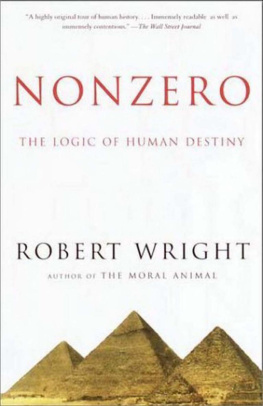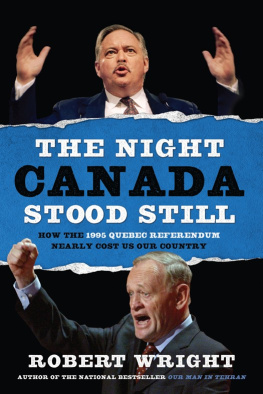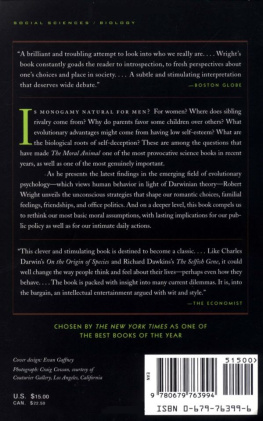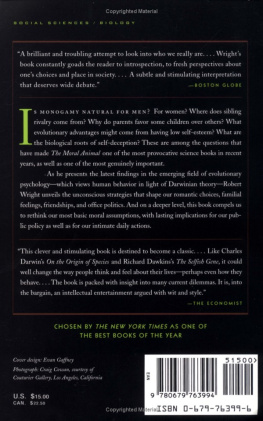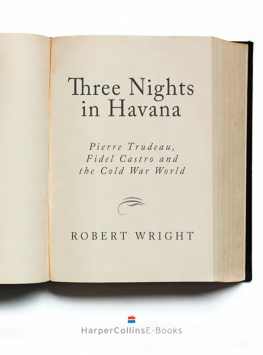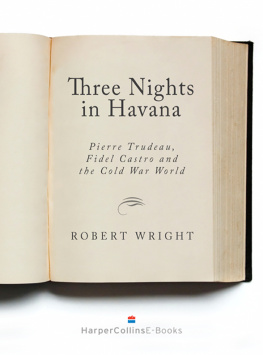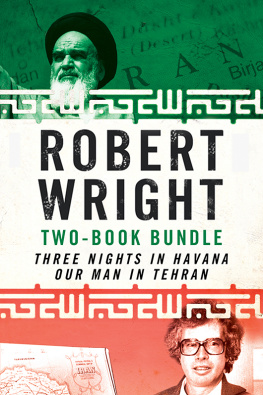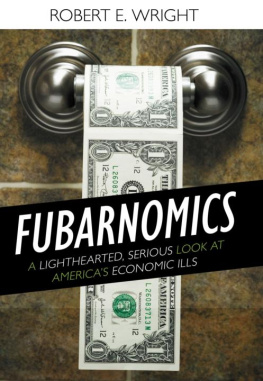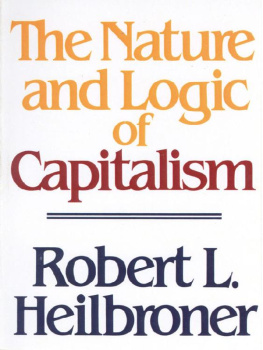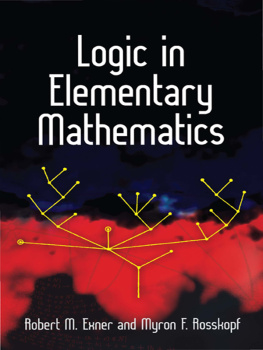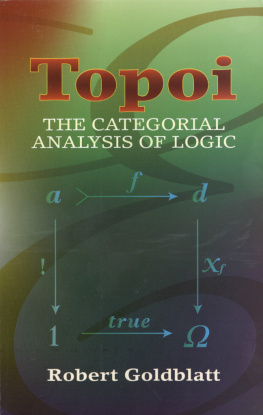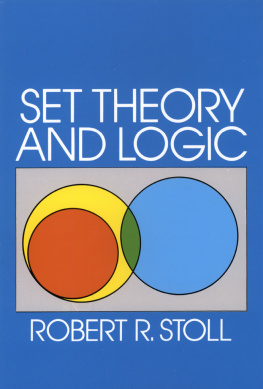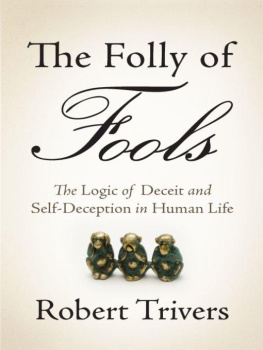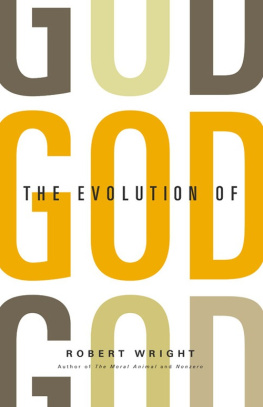Robert Wright - Nonzero: The Logic of Human Destiny
Here you can read online Robert Wright - Nonzero: The Logic of Human Destiny full text of the book (entire story) in english for free. Download pdf and epub, get meaning, cover and reviews about this ebook. year: 2001, publisher: Vintage, genre: Science. Description of the work, (preface) as well as reviews are available. Best literature library LitArk.com created for fans of good reading and offers a wide selection of genres:
Romance novel
Science fiction
Adventure
Detective
Science
History
Home and family
Prose
Art
Politics
Computer
Non-fiction
Religion
Business
Children
Humor
Choose a favorite category and find really read worthwhile books. Enjoy immersion in the world of imagination, feel the emotions of the characters or learn something new for yourself, make an fascinating discovery.
- Book:Nonzero: The Logic of Human Destiny
- Author:
- Publisher:Vintage
- Genre:
- Year:2001
- Rating:5 / 5
- Favourites:Add to favourites
- Your mark:
- 100
- 1
- 2
- 3
- 4
- 5
Nonzero: The Logic of Human Destiny: summary, description and annotation
We offer to read an annotation, description, summary or preface (depends on what the author of the book "Nonzero: The Logic of Human Destiny" wrote himself). If you haven't found the necessary information about the book — write in the comments, we will try to find it.
Nonzero: The Logic of Human Destiny — read online for free the complete book (whole text) full work
Below is the text of the book, divided by pages. System saving the place of the last page read, allows you to conveniently read the book "Nonzero: The Logic of Human Destiny" online for free, without having to search again every time where you left off. Put a bookmark, and you can go to the page where you finished reading at any time.
Font size:
Interval:
Bookmark:
Acclaim for Robert Wrights
NONZERO:
The Logic of Human Destiny
An original, accessible and thought-provoking view of history... full of rich detail, ingenious insight and bold argument. The Economist
Wright carries his learning lightly, and his bold attempt to uncover parallels between organic evolution and the development of human cultures makes for a compelling synthesis.... Wright is right about so many things: evolution is seeded with inevitabilities, cultures have common trajectories, and human history has seen great hopes and terrible crimes but is capable of achieving a final destiny. Simon Conway Morris, The New York Times Book Review
An extraordinarily insightful and thought-provoking book.... Wright does an astonishingly effective job of finding directionality in history, not just over the past few thousand years but over the almost four billion years since the beginning of life on earth. Francis Fukuyama, The Wilson Quarterly
A dazzling tour of world history.... Although he takes into account the tooth-and-claw battles of nations, the vanished empires, social violence and chaos, the shocks and changes of technology, Mr. Wright finds pattern and meaning in history. We are moving toward connectedness, toward one world.... Does that mean we can rest on our laurels and simply let the game go on? No; Mr. Wright wants us consciously to take charge. The Ottawa Citizen
A must for history buffs... highly readable.... Wrights chatty, informal style makes all the difference. The Singapore Straits Times
At long last, here is a millennium book that is definitely worth reading.... An enormously skillful summary of everything you always wanted to know about history and science but were afraid to ask. David Davidar, The Hindu (India)
A genuine advance in our understanding of how we came to be, and where we are headed.... Wethe sorry mass of humanityhave made history, but we have often proceeded blindly and without the least understanding of the great project in which we are engaged. Wright should be content that he has described, better than anyone in recent days, the nature and scope of that endeavor. John Judis, The Washington Monthly
Books that search for grand themes in history are almost impossible to write well, but when successful, make a lasting impression on thought. Nonzero is such a work. Brilliant, sweeping, and alive with insight, it is the first really important book of the new decade. Gregg Easterbrook, beliefnet.com
Generous and urgent scholarship about everything from the function of war among native North American peoples to the origins of language... provided with witty style, energy, and an attractive sort of bold humility. Lionel Tiger, National Review
Grand and entertaining... perceptive and thought-provoking. Boston Herald
Nonzero is a zealous and often thrilling gloss of all of human historya work of philosophical derring-do from one of Americas alpha minds. Virginia Heffernan, Talk
Amusing and bold and at the same time illuminating, contentious and controversial. Toronto Globe & Mail
I recommend Nonzero to any and all readers as a marvelous ummary and interpretation of what is now known and surmised about biological and human history on our planet.... Wright knows so much and has thought so clearly; and allows his imagination to range so freely! William H. McNeill, University of Chicago, author of Plagues and People and The Rise of the West
Wrights chapters on the evolution of biological complexity and intelligencein addition to being beautifully written and scientifically soundare a welcome corrective to current trendy views that understate natural selections creative power. There is, indeed, as Darwin said, a grandeur in this view of life. James Gould, Princeton University, author of Biological Science
Introduction
PART I: A BRIEFHISTORY OF HUMANKIND
1. The Ladder of Cultural Evolution
2. The Way We Were
3. Add Technology and Bake for Five Millennia
4. The Invisible Brain
5. War: What Is It Good For?
6. The Inevitability of Agriculture
7. The Age of Chiefdoms
8. The Second Information Revolution
9. Civilization and So On
10. Our Friends the Barbarians
11. Dark Ages
12. The Inscrutable Orient
13. Modern Times
14. And Here We Are
15. New World Order
16. Degrees of Freedom
PART II: A BRIEF HISTORY OF ORGANIC LIFE
17. The Cosmic Context
18. The Rise of Biological Non-zero-sumness
19. Why Life Is So Complex
20. The Last Adaptation
PART III: FROM HERE TO ETERNITY
21. Non-crazy Questions
22. You Call This a God?
Appendix I: On Non-zero-sumness
Appendix II: What Is Social Complexity?
Bibliography
Index
THE STORM BEFORE THE CALM
A great many internal and external portents (political and social upheaval, moral and religious unease) have caused us all to feel, more or less confusedly, that something tremendous is at present taking place in the world. But what is it?
Pierre Teilhard de Chardin
The Nobel laureate Steven Weinberg once ended a book on this note: The more the universe seems comprehensible, the more it also seems pointless. Far be it from me to argue with a great physicist about how depressing physics is. For all I know, Weinbergs realm of expertise, the realm of inanimate matter, really does offer no evidence of overarching purpose. But when we move into the realm of animate matterbacteria, cellular slime molds, and, most notably, human beingsthe situation strikes me as different. The more closely we examine the drift of biological evolution and, especially, the drift of human history, the more there seems to be a point to it all. Because in neither case is drift really the right word. Both of these processes have a direction, an arrow. At least, that is the thesis of this book.
People who see a direction in human history, or in biological evolution, or both, have often been dismissed a mystics or flakes. In some ways, its hard to argue that they deserve better treatment. The philosopher Henri Bergson believed that organic evolution is driven forward by a mysterious lan vital, a vital force. But why posit something so ethereal when we can explain evolutions workings in the wholly physical term of natural selection? Pierre Teilhard de Chardin, the Jesuit theologian, saw human history moving toward Point Omega. But how eriously could he expect historians to take him, given that Point Omega is outside Time and Space?
On the other hand, you have to give Bergson and Teilhard de Chardin some credit. Both saw that organic evolution has a tendency to create forms of life featuring greater and greater complexity. And Teilhard de Chardin, in particular, stressed a comparable tendency in human history: the evolution, over the millennia, of ever more vast and complex social structures. His extrapolations from this trend were prescient. Writing at the middle of this century, he dwelt on telecommunications, and the globalization it abets, before these subjects were all the rage. (Marshall McLuhan, coiner of global village, had read Teilhard.) With his concept of the noosphere, the thinking envelope of the Earth, Teilhard even anticipated in a vague way the Internetmore than a decade before the invention of the microchip.
Can the trends rightly noted by Bergson and Teilhardbasic tendencies in biological evolution and in the technological and social evolution of the human speciesbe explained in scientific, physical terms? I think so; that is largely what this book is about. But the concreteness of the explanation neednt, I believe, wholly drain these pattern of the spiritual content that Bergson and Teilhard imputed to them. If directionality is built into lifeif life naturally moves toward a particular endthen this movement legitimately invites speculation about what did the building. And the invitation is especially strong, Ill argue, in light of the phase of human history that seems to lie immediately aheada social, political, and even moral culmination of sorts.
Font size:
Interval:
Bookmark:
Similar books «Nonzero: The Logic of Human Destiny»
Look at similar books to Nonzero: The Logic of Human Destiny. We have selected literature similar in name and meaning in the hope of providing readers with more options to find new, interesting, not yet read works.
Discussion, reviews of the book Nonzero: The Logic of Human Destiny and just readers' own opinions. Leave your comments, write what you think about the work, its meaning or the main characters. Specify what exactly you liked and what you didn't like, and why you think so.

